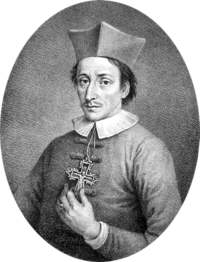Nicolas Steno Cleric
Nicolas Steno (Danish: Niels Stensen; Latinized to Nicolaus Stenonis or Nicolaus Stenonius; 1 January 1638 – 25 November 1686 [NS: 11 January 1638 – 5 December 1686]) was a Danish scientist, a pioneer in both anatomy and geology who became Catholic bishop in his later years. Steno was trained in the classical texts on science; however, by 1659 he seriously questioned accepted knowledge of the natural world. Importantly he questioned explanations for tear production, the idea that fossils grew in the ground and explanations of rock formation. His investigations and his subsequent conclusions on fossils and rock formation have led scholars to consider him one of the founders of modern stratigraphy and modern geology.Born to a Lutheran family, Steno converted to Catholicism in 1667. After his conversion, his interest for natural sciences rapidly waned giving way to his interest in theology. At the beginning of 1675, he decided to become a priest. Four months after, he was ordained in the Catholic clergy in Easter 1675. As a clergyman, he was later appointed by Pope Innocent XI Vicar Apostolic of Nordic Missions and Titular Bishop of Titopolis. Steno played an active role in the Counter-Reformation in Northern Germany. He was venerated as a saint after his death and the Roman Catholic canonization process was begun in 1938. John Paul II'>Pope John Paul II beatified Steno in 1988.
Search
Topical connections
Nicolas Steno on Wikipedia
External resources
- http://books.google.com/?id=6al2BH438AYC&pg=PA82&lpg=PA82&dq=ductus+stenonianus
- http://books.google.es/books?id=xz28AAAAIAAJ&hl=es&pg=PP5#v=onepage&q&f=false
- http://dlibrary.acu.edu.au/research/theology/ejournal/aejt_5/Sobiech.htm
- http://gallica.bnf.fr
- http://gallica.bnf.fr/ark:/12148/bpt6k106685b.r=stenon.langEN
- http://ia600303.us.archive.org/load_djvu_applet.php?file=26/items/EncyclopaediaBritannica1911HQDJVU/Encyclopedia_Britannica_25_Shwebo_-_Subliminal_self.djvu
- http://journals.lww.com/neurotodayonline/Fulltext/2004/11000/Steno_s_Amazing_Neuroanatomy_Lecture_Sticks_After.14.aspx
- http://lhldigital.lindahall.org/cdm/ref/collection/earththeory/id/16651
- http://lhldigital.lindahall.org/cdm/ref/collection/earththeory/id/6605
